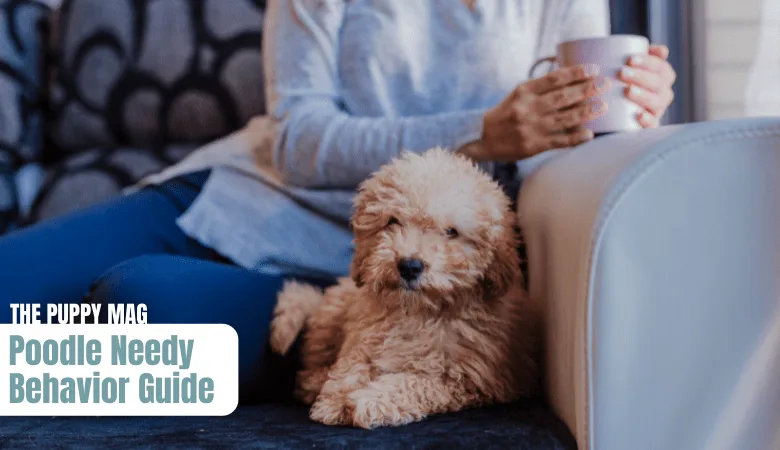If your poodle is exhibiting clingy and needy behavior it can become concerning quickly, especially when it’s excessive. In this article, we’ll cover the causes behind needy behavior, what it means, and how to best deal with it.

Table of Contents
Is Your Poodle Excessively Clingy/Needy?
To what level is it normal for our dogs to miss us when we’re gone and to get excited when we return?
Is it okay for our dogs to want to lay on us all evening long or to follow us every time we exit the room?
We typically say a dog is “too” needy when their mood and behavior interfere with everyday life. If it is becoming an issue (to either you or your pet), things need to change.
Perhaps you’ve started going out less or for shorter periods of time in order to keep your pooch content? Or, maybe you have a shadow walking behind you at all times when trying to get about your day at home.
The bottom line is, if you think their clinginess is an issue, then it probably is.
Likely Causes Behind Your Poodle’s Neediness
It isn’t always easy to pinpoint why a Poodle has become over-reliant on you, or on other family members.
Needy behavior in poodles is usually worsened by us when we grant them attention whenever they demand it. This keeps reinforcing needy behavior. Additional reasons include boredom, being left alone too long, a lack of socialization, or past trauma (rescue dogs).
Things to consider:
Their initial socialization:
All dogs have a period in their puppy lives when they learn what is ‘normal’ when it comes to interacting with humans. If they were shown too little or too much attention, they may not have developed a well-rounded set of social skills.
Past traumas in their early life:
Perhaps your furry friend had a difficult or uncertain start in life. Maybe they have had a few prior homes or even spent time in kennels. When a dog’s background has been unpredictable, it is more likely that they will lean on us for support.
Accidental reinforcement of the neediness: (very common)
Some owners will unwittingly make their Poodle’s behavior worse by offering constant reassurance and treats when they sense their anxiety. This can reinforce the negative behavior and mean it worsens over time.
Conversely, there are some who may actively punish the behavior by shouting or locking the dog away. This can be hugely detrimental and will only serve to increase nervous tendencies.
Being left alone too long, too often:
Even the most chilled-out dog may start to get ants in their pants if we leave them to their own devices for hours and hours every day. We need to be realistic about how long they are without us. While adult dogs should be okay alone for a few hours, it isn’t fair to leave them for the whole day. These dogs should be put in doggy daycare or should have a dog walker who comes to alleviate their boredom mid-day.
Boredom:
For some dogs, we are their best source of entertainment so they gravitate towards us. This is especially true in households where there is little in the way of other things to do. Without alternative activities (like training games, interactive toys, exercise, and canine socialization), it’s not surprising they may look to us for some diversion.
Genetics:
Some Poodle lines are more high-strung than others and are more prone to developing needy behaviors. Genetic traits can be modified and we don’t have to admit defeat just because our dog comes from a line of worriers!

Psst. A word on Poodle training! Brain Training For Dogs could be the best training approach we’ve seen for all poodles. Results show improvement in obedience and behavior quicker than we thought possible! It’s absolutely worth checking out.
Could Clingy Behavior Be Caused By a Health Issue?
If your poodle has suddenly become needier than before, we may be dealing with a medical issue. An unexplained change in temperament should have you popping to your vet for a check-up.
Potential health issues that could lead to clingy/needy behavior
- A source of chronic pain such as dental disease or joint disease
- Canine dementia / cognitive decline in the senior dog
- Increased hunger or thirst caused by e.g. diabetes, Cushing’s disease, or corticosteroid
- Medication
- Hearing loss
- Vision loss
If you notice your poodle to have any additional symptoms like diarrhea, vomiting, nausea, lethargy, or refusing to eat her food on top of showing neediness, then the chances of a health issue are increased.
As always, it’s best to be safe than sorry, so if the needy behavior is accompanied by other symptoms, or has happened all of a sudden with no explanation, a health check-up is advised.
Are Poodles More Predisposed To Clingy Behavior?
Generally speaking, Poodles should be good-tempered, confident, and sociable. They are undeniably intelligent and, for some, this can be their downfall. Poodles can be ‘over-thinkers who may worry about things that other dogs do not.
For example, you may notice that your Poodle knows you will be leaving the home soon, even when you have not made it obvious. This level of perception can be their downfall and can make anxiety worse.
While the Poodle isn’t the biggest ‘velcro dog’ of them all, they are somewhat more predisposed than others. Of the three sizes, anecdotally the Miniature Poodle is the clingiest.
How To Manage Your Poodle’s Needy Behavior
The best ways to help your poodle ultimately depend on the extent of the needy behavior you’re dealing with.
Dogs who have extreme anxiety and who are finding it hard to cope, need prompt intervention. In these more serious cases, it is best to work alongside your vet and a canine behaviorist. Your vet may prescribe some anxiolytic drugs while your behaviorist will tailor-make a program for your poodle.
For those that are coping better and whose symptoms of neediness are not extreme, there are plenty of things that we can start to try at home.
If you find your dog is overly dependent on you over others, let other family members take over when it comes to feeding and walk time. This doesn’t have to be forever but can help to break an unhealthy dependence.
Come up with fun and interesting ways to keep your Poodle entertained. This clever dog needs a lot more than a simple trot around the block twice a day. Consider agility training, command training and scent work to help keep their brains engaged. On top of this, offer plenty of exercise (the amount of which will vary depending on size and age).
When left alone or when you want some time without your pooch at your feet, set your dog up for success. This may mean having a calming pheromone plug in (such as Adaptil) switched on, as well as a cosy bed set up.
Make sure they have something to occupy their time, such as a stuffed Kong food toy, snaffle mat, or lick mat. Remember, the more things your dog has to keep their mind off your absence, the better.
Last Thoughts
When you are the owner of a clingy pup, it can feel like you never get a moment alone. You may start to worry that you and your Poodle will never enjoy a ‘normal relationship’.
But rest assured, the majority of dogs will improve once we set the correct boundaries and set them up for success.
If you find that you are not seeing any progress, it is best to speak to a professional who will be able to offer expert advice tailored to your dog’s unique needs.
Back to more Poodle articles >>>
